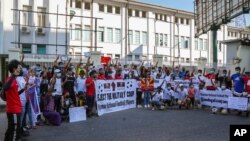Myanmar’s widespread protests continued for an eighth day Saturday, after Friday’s demonstrations in the city of Mawlamyine saw several arrests and rubber bullets fired.
In Yangon, protesters held signs reading “Stop kidnapping at night” in response to night raids that occurred in recent days.
It is those raids that have local communities anxious, as the junta has attempted to arrest prominent protesters from their homes and offices.
Since protests against the coup began, medical staff members have joined the Civil Disobedience Movement, a strike campaign that rejects the rule of the military, referred to as CDM.
They insist they will not return to work until Myanmar’s elected leaders are returned to power. Several other professional sectors have followed, including bankers, teachers and engineers.
Demonstrations have continued despite a ban on gatherings of five or more people. Several towns in Myanmar are also under a military-imposed curfew from 8 p.m. to 4 a.m.
Local media reported Thursday that military coup leader Senior General Min Aung Hlaing told medical staff members during a public speech to “go back to work.”
On Friday morning, military-backed police detained a health worker, and CCTV footage of the arrest was widely shared on social media. The Assistance Association for Political Prisoners, a watchdog group, posted the news on their daily blog.
At around 9 a.m., a medical doctor identified as Pyae Phyo Naing was detained in Ingapu Township in Ayeyarwady for his alleged participation in the CDM.
His wife, Dr. Phyu Lei Thu, also a medical professional, told VOA that five armed policemen arrested her husband. She said she eventually discovered he is being held at the Ingapu police station but she has not been allowed to see him or been given a reason for his arrest.
“I feel depressed and sad. I have no hope for my husband,” she told VOA, adding, “Now most of the health workers are being chased, they are worried that the staff will not do the CDM.”
Another health worker from Myanmar who requested anonymity, said they had not been targeted yet but support the movement against the junta.
“The difference we suffered under the military was so many. We don’t want to live in fear anymore,” the doctor told VOA.
In response to the reports the military has been arresting those participating in rallies, Thurein Hlaing Win, a Yangon health care expert, told VOA the CDM has already had an effect on the junta.
"The military government has been damaged quite extensively by the CDM. They want to threaten the other civil servants that if you participated in the movement, you will be arrested. So, they made a show of force and trying to scare people,” he said.
However, civilians have reacted by defying night curfews and gathering in the streets to protect those targeted. Tactics such as banging pots and pans to alert neighbors of approaching police have also had an effect.
“Half of the abductions were prevented by the people living around in that area," Thurein Hlaing Win added.
Aung Thu Nyein, a Burmese political analyst, played down the worries of prominent protesters being arrested at night in Yangon.
“In many cases, these are rumors and may be intending to make people confused. But [a] violent crackdown is not yet out of the question and I think the military is not weak,” Aung Thu Nyein told VOA.
Aung Thu Nyein predicted that March 27, which is Tatmadaw Day in Myanmar, could be a definitive date for the large-scale demonstrations. He admitted having concerns about how long protests could be sustained.
“The problem for the protesters is no unified leadership and no end-game political strategy,” he added.
Translation by Zin Thu Aung







